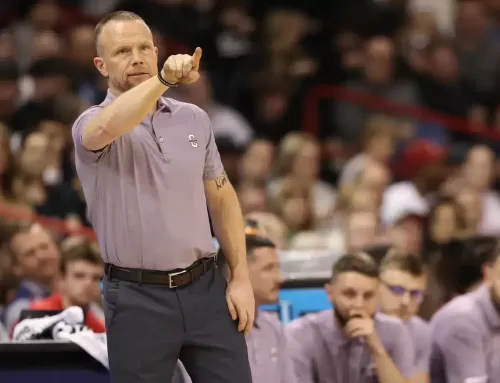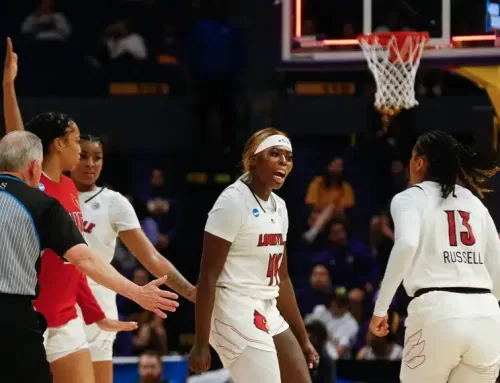By Baylee Pulliam–
When Leah Eleazer puts on her Kentucky National Guard 1st Lt. uniform, she becomes a different person.
“When you’re out of your uniform, you can be you,” said Eleazer, a graduate student at the University of Louisville’s Kent School of Social Work. “But when you put the uniform on…you’re doing your job and you just don’t talk about it.”
Eleazer identifies as queer. Under 1993’s Don’t Ask, Don’t Tell, she was required to keep her sexual identity a secret from the military, or risk being discharged.
But following the enactment of the Don’t Ask, Don’t Tell Repeal Act of 2010 on Sept. 20, Eleazer will be allowed to serve openly.
According to a research brief released by the Williams Institute at the UCLA School of Law, an estimated 66,000 gays, lesbians and bisexuals currently serve in the U.S. military – about 2 percent of all military personnel.
In addition to allowing gay and lesbian soldiers to serve openly, soldiers who had been discharged “based solely on their sexual orientation will be eligible to reapply to return to military service,” according to a press release from the Department of Defense.
While Eleazer said the Don’t Ask, Don’t Tell policy protected gay service members from having to disclose their sexual orientation, it was not without problems.
The 1993 policy, she said, served as an unintentional shield for some other soldiers’ derogatory comments and actions.
“I’ve had people call me a dyke and things like that,” Eleazer said. “People will say something homophobic and then look at you like ‘I dare you to say something.’…You kind of lose your voice.”
Eleazer said some homosexual soldiers suffered a worse fate.
She said there was a man in her basic training unit who was beaten repeatedly after telling a fellow soldier he was gay.
“You have some people who suffer harassment or even very physical abuse,” Eleazer said. She said many were reluctant to seek help because they were afraid of being discharged.
The man, she said, became suicidal and was put on suicide watch. Eleazer said she heard later from a friend that he had killed himself.
Because soldiers’ sexual identity was largely a secret under the policy, discrimination is difficult to quantify.
Lt. Col. Kevin Raybine of the University of Louisville Air Force ROTC detachment 295 said trying to judge the effectiveness of the old policy is like “trying to describe the unknown.”
“We don’t know how well it worked because we don’t know who was gay,’ Raybine said. “That’s the ‘Don’t Tell,’ part of the law.”
But under the repeal, soldiers will be able to report discrimination without fear of being discharged.
“I think it’s going to do a lot for soldiers in the context of military sexual trauma, and for actually being able to report harassment and discrimination,” Eleazer said. “You can actually speak out about it without incriminating yourself.”
Raybine said the U of L ROTC “culture has always been very inclusive.”
“Cadets are held to a high standard,” Raybine said. “There’s never been a culture of exclusion here, and we work very hard to ensure that.”
The military underwent awareness training in preparation for the repeal, Raybine said. “For the past few months, we’ve been administrating this process to make the transition smooth.”
Earlier in September, the Pentagon reported 97 percent of the military had undergone training in the new law.
“At U of L, we’re at 100 percent,” Raybine said.
Eleazer said she didn’t think the repeal would change anything in terms of the way she does her job, but she thought it would help her uphold the principles of the U.S. military.
“The way I look at it is, I’m just not going to lie anymore,” Eleazer said. “If you look at the army values, integrity’s one of those. And I think this will do a lot for [lesbian, gay and bisexual] soldiers in the fact that they can maintain their integrity, and not have to lie.”
President Obama mirrored the sentiment in his Sept. 20 release, saying “as of today, patriotic Americans in uniform will no longer have to lie about who they are in order to serve the country they love.”
While the repeal allows gays to serve openly, it doesn’t afford gays and lesbians the same spousal privileges as it does to heterosexual couples, such as easing the cost of housing.
Affording equal benefits would oppose the “definitions of ‘marriage’ and ‘spouse’” in the Defense of Marriage Act, reads the repeal bill.
“I think it would be great if they could get all of those benefits,” Eleazer said. “But hey, one step at a time, right?”




